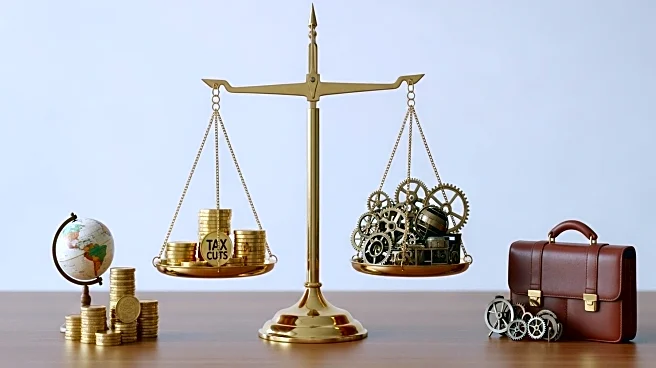What is the story about?
What's Happening?
The One Big Beautiful Bill Act (OBBBA), enacted in July 2025, introduces significant tax cuts for U.S. businesses, marking the largest set of reductions since the 2017 Tax Cuts and Jobs Act. The legislation aims to boost domestic investment in tangible production, with wholesale trade among the sectors benefiting from these changes. The OBBBA revives 100 percent bonus depreciation for short-lived investments and repeals the five-year amortization of domestic R&D expenses, favoring immediate expensing. It also makes permanent a more generous limitation for interest deductions and introduces a new 100 percent deduction for structures related to tangible production, available for buildings placed into service before 2031. These provisions are expected to reduce tax liabilities for C corporations, with wholesale trade projected to see a $9.2 billion decrease in tax liability by 2026.
Why It's Important?
The tax cuts under the OBBBA are poised to significantly impact U.S. industries, particularly manufacturing, information, and mining, which will see the largest reductions in tax liability. For wholesale trade, the tax relief is expected to enhance competitiveness and encourage investment in infrastructure and operations. This legislative change could lead to increased economic activity and job creation within the sector, benefiting both businesses and consumers. However, the varying impact across industries highlights the need for strategic planning to maximize the benefits of these tax changes.
What's Next?
As the OBBBA provisions take effect, businesses in the wholesale trade sector may need to reassess their investment strategies to capitalize on the tax benefits. Companies might explore expanding their operations or investing in new technologies to improve efficiency and competitiveness. Stakeholders, including industry leaders and policymakers, will likely monitor the economic impact of these tax changes and consider further adjustments to support growth across different sectors.
Beyond the Headlines
The OBBBA's focus on tangible production underscores a broader shift towards strengthening domestic manufacturing capabilities. This legislative move may prompt discussions on the ethical and environmental implications of increased production, as well as the long-term sustainability of such economic policies. Additionally, the emphasis on immediate expensing for R&D could drive innovation, potentially leading to advancements in technology and industry practices.
















